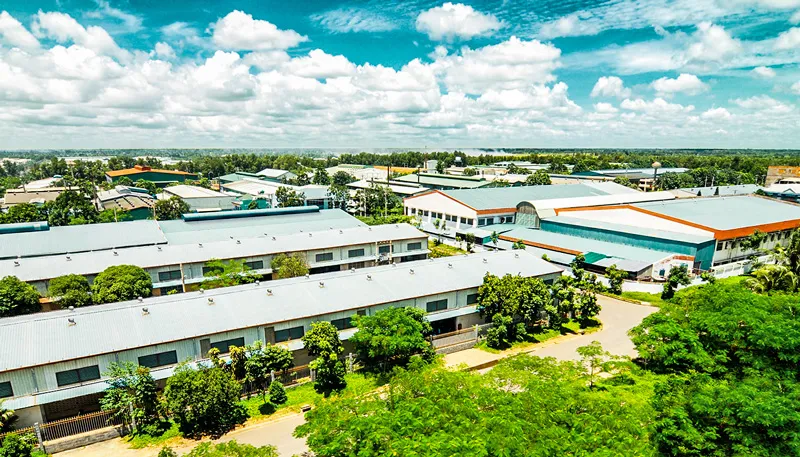
JOURNALIST: - Sir, the Tanimex Company believes that the land rent policy under Decree 142/2005 has many shortcomings, making it difficult for industrial zones and enterprises to lease land. Is this correct?
Mr. NGUYEN VAN BE: - Previously, land rent in industrial zones was stable for the first five years, then increased once after every five years but by no more than 15%. This provision was very convenient for businesses in estimating input costs and deciding on further investment and production expansion plans. However, Decree 142/2005 now stipulates that land rent in the industrial zones will apply as per market rate similar to residential land in adjacent areas.
This provision is extremely inadequate and is causing many difficulties for enterprises wanting to lease land in industrial zones and for investors putting money in these industrial zones. Therefore, manufacturing enterprises are facing uncertainty in input costs, and are looking for more stability in the issue of land rentals. On the other hand, some industrial zones are having problems in leasing, such as in the Hiep Phuoc Industrial Park, and also in the Tan Binh Industrial Park where disputes and lawsuits between investor and lessee are delaying expansion in the Tanimex Company.
- Sir, what is your opinion on the lawsuit at Tan Binh Industrial Park filed by the lessee who is not agreeing to pay the land rent according to the market rate after five years?
- First, it must be accepted that the usage of land in industrial zones is very different from residential land. The land in industrial parks is meant to serve for production and business activities, and not retail, so there is no immediate profit from the land. Therefore, the application of market rate in industrial zones similar to residential land is very unreasonable.
Second, the procedure of valuing land is facing many problems, although the law offers many methods of calculation. As far as I know, many real estate projects also need help because they are not allowed to pay land use fees due to land valuation delays for many years. Therefore, market rate in industrial parks for land rentals may increase continuously. As a result, the Tan Binh Industrial Park expanded after two adjustments, increasing thirteen times, causing conflict with the lessee, and at the same time facing a deadlock by which the land now cannot be leased, as is the case in Hiep Phuoc Industrial Park.
- Sir, compared with some other provinces, what is the land rent policy for Ho Chi Minh City?
- Decree 142/2005 allows provinces to decide for themselves whether to collect land rent one time or annually. As far as I know, the neighboring provinces of Ho Chi Minh City, and some other places also, allow businesses to pay one time only for the entire lease period, and companies that are granted a land use right certificate (LURC) during this period can borrow from banks, and also invest. In Ho Chi Minh City, this is not easy to do, because paying one time involves a very large amount, as the price of residential land at market rate within the City limits is very high, and so it is difficult for businesses to pay such a huge lump sum. However, the annual revenue collection has shortcomings as mentioned above, which are ambiguous and also tend to increase too fast and too high. These problems make investment in industrial parks in Ho Chi Minh City less attractive.
- Sir, there is an opinion that land in Ho Chi Minh City is of very high value, and if land rental in the industrial zones is not collected at the same market rate as residential land, the budget could be affected. Would you agree with this opinion?
- Land rental is not the main source of income for industrial zones. The main source of income is from development, production and business activities. Therefore, we should not expect land rent from industrial zones. When an Industrial Park attracts many investment enterprises, it shows an increase in export turnover, creates jobs, and attracts technology brainpower, which all then subsequently increases the budget in the long-term. For example, the Hi-Tech Park in District 9 was supported by the initial land rental exemption policy, and many large foreign corporations invested here, which then helped increase the budget of Ho Chi Minh City. Therefore, it is necessary to have stable policies, and create a favorable environment for businesses to invest further.
Regarding the problem of land rental by the investor in Tan Binh Industrial Park at the Tanimex Company, the Association of Industrial Zones in Ho Chi Minh City has taken note of the petition. We will gather together all facts of the problems related to land rental in this industrial zone, as well as other industrial zones in the City to propose to the Government for an appropriate adjustment.
Please also add that the Hiep Phuoc Industrial Park has just announced a huge loss of approximately VND 788 bn in its 2019 audit report. In 2019, the company did not have many land lease payments, so the total revenue for the whole year decreased by 38%, equivalent to VND 281 bn. Revenue which came from leasing land in Phase-1 and Phase-2 decreased by 32% and 37%, respectively. The appraisal of land rental unit price in this Industrial Zone was being carried out since 2015 with many meetings with related units, but up until now, they have not agreed on any price structure.




















